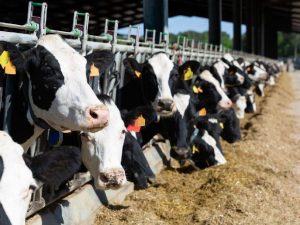
U.S. Sen. Ben Ray Luján on Friday commended a recent rule change by the U.S. Department of Agriculture that created a pathway for farmers to
receive payments through the Dairy Indemnity Payment Program.
Previously, farmers were able to get payments for lost milk production but could not get paid for their cows.
Luján said in a statement that New Mexico farmers and ranchers are critical contributors to the state’s economy and that many producers have been brought to the verge of bankruptcy due to inaction and because programs that were designed to provide a safety were not working.
“Beyond the moral imperative of the federal government providing just compensation, this announcement is part of a broader effort to support the dairy industry and rural communities,” he said.
At one dairy near Cannon, Luján’s office said an estimated 5,200 cows were impacted and about 2,000 of the animals have died.
New Mexico sued the Air Force in 2019 over PFAS contamination at Cannon and at Holloman Air Force Base in Southern New Mexico.
The state argued that the federal government had a responsibility to clean up plumes of toxic chemicals left behind by past military firefighting activities.
The synthetic chemicals known as per- and polyfluoroalkyl substances also are used in products ranging from cookware to carpets and have been increasingly showing up in drinking water systems, wells and food. They have been associated with health problems including cancer and reduced birth weight.
They often are referred to as “forever chemicals” because they do not easily degrade and can remain in the body for years.
Last year, the EPA announced a new strategy to regulate them.
In New Mexico, the Air Force began installing monitoring wells in March to determine the extent of “forever chemicals” in and around Cannon, which is located near the community of Clovis. The locations for the wells were determined following an extensive effort that involved the collection of soil and groundwater samples.
Air Force officials said the data collected from the wells will help determine potential future full-scale response efforts.
























